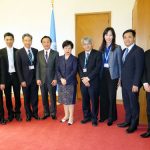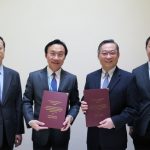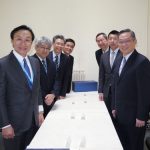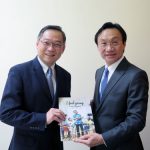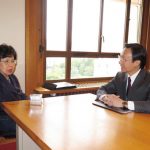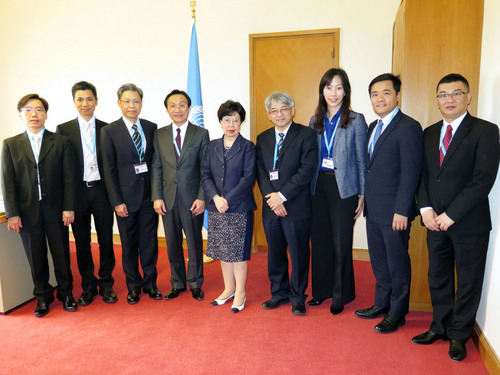 The Government delegation poses for a photograph with the Director-General of the World Health Organization, Ms Margaret Chan (centre), in Geneva, Switzerland
The Government delegation poses for a photograph with the Director-General of the World Health Organization, Ms Margaret Chan (centre), in Geneva, Switzerland
Local doctors are likely to have the opportunity to develop their medical skills in Singapore, under a memorandum of cooperation signed by Singapore and Macao. The Secretary for Social Affairs and Culture, Mr Tam Chon Weng, signed the memorandum of cooperation with Singapore’s Minister for Health, Mr Gan Kim Yong, in Geneva, Switzerland. Mr Tam was in Geneva to attend the 69th World Health Assembly of the World Health Organization (WHO). Other items in the memorandum of cooperation included: joint training for medical staff from Singapore and Macao; the establishment of a response mechanism for health emergencies; and the creation of a platform for information sharing and exchanges. In a meeting on 24 May (Tuesday), Mr Tam told Mr Gan that Singapore and Macao maintained a close exchange mechanism on medical affairs. That included Macao medical staff regularly attending seminars held in Singapore, and Singapore doctors providing a number of medical services in Macao. Strengthening cooperation between Singapore and Macao would not only benefit the two places, but also would contribute to the regional development of medical services, Mr Tam said. Mr Gan said the Singapore Government was pleased to provide more training opportunities to Macao doctors. Singapore doctors could also come to Macao – if needed – to provide technical support and deepen exchanges, he added. Earlier on Tuesday in Geneva, Mr Tam met with the Director-General of the World Health Organization, Ms Margaret Chan, to exchange views about the development of medical services in Macao. The Secretary briefed Ms Chan about the Government’s proposal to build a centre for treatment of infectious diseases and about the strategies to strengthen prevention and control of communicable diseases. Ms Chan spoke highly of the Government’s efforts in maintaining and improving the city’s public health infrastructure and services over the years. She advised the Government nonetheless to remain vigilant regarding any potential outbreak in Macao of disease. Those diseases already reported in other parts of the world would be a particular focus for attention given that Macao is a popular tourism destination for travellers from all over the globe. Regarding the centre the Government intends to build for treatment of infectious diseases, Ms Chan said she fully understood the plan and expressed her support for the project. Other topics discussed during the meeting included: the development of Macao’s traditional Chinese medicine (TCM) industry; and the organisation of a seminar on TCM to be held in Macao later this year. The Government delegation concluded on Wednesday its three-day visit to Geneva. During the trip, the delegation attended the 69th World Health Assembly. Mr Tam also had meetings in Geneva with the mainland’s Minister of National Health and Family Planning Commission, Ms Li Bin; and the Secretary for Food and Health of the Hong Kong Special Administrative Region, Mr Ko Wing-man. Members of the Macao Government delegation included: the Director of the Health Bureau, Mr Lei Chin Ion; the Deputy Director of the Health Bureau and Director of the Conde S. Januário Hospital, Mr Kuok Cheong U; and consultants to the Office of the Secretary for Social Affairs and Culture. The 69th World Health Assembly, with the theme “Transforming our World: the 2030 Agenda for Sustainable Development”, is being held from 23 to 28 May in Geneva. The World Health Assembly is the supreme decision-making body of the World Health Organization. Its main functions are to stipulate WHO policies, supervise its finances, and review and approve the proposed programme budget.
View gallery

